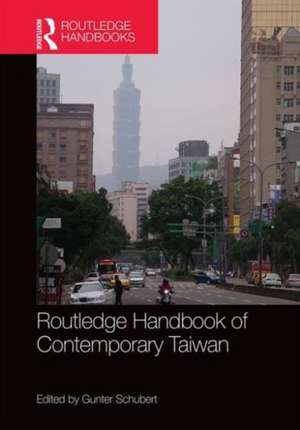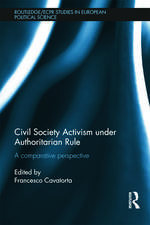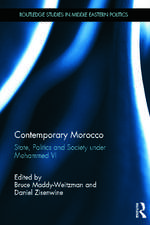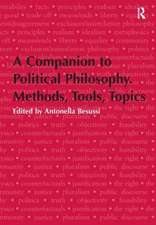Routledge Handbook of Contemporary Taiwan
Editat de Gunter Schuberten Limba Engleză Hardback – 2 iun 2016
Written by an international team of experts, the chapters included in the volume form an accessible and fascinating insight into contemporary Taiwan. Up-to-date, interdisciplinary, and academically rigorous, the Handbook will be of interest to students, academics, policymakers and others in search of reliable information on Taiwanese politics, economics, culture and society.
| Toate formatele și edițiile | Preț | Express |
|---|---|---|
| Paperback (1) | 409.25 lei 6-8 săpt. | |
| Taylor & Francis – 30 iun 2020 | 409.25 lei 6-8 săpt. | |
| Hardback (2) | 1250.03 lei 6-8 săpt. | |
| Taylor & Francis – 2 iun 2016 | 1250.03 lei 6-8 săpt. | |
| Taylor & Francis – 16 dec 2024 | 1546.04 lei 6-8 săpt. |
Preț: 1250.03 lei
Preț vechi: 1675.40 lei
-25% Nou
Puncte Express: 1875
Preț estimativ în valută:
239.30€ • 246.11$ • 198.53£
239.30€ • 246.11$ • 198.53£
Carte tipărită la comandă
Livrare economică 18 februarie-04 martie
Preluare comenzi: 021 569.72.76
Specificații
ISBN-13: 9781138781870
ISBN-10: 1138781878
Pagini: 588
Ilustrații: 16
Dimensiuni: 174 x 246 x 36 mm
Greutate: 1.16 kg
Ediția:1
Editura: Taylor & Francis
Colecția Routledge
Locul publicării:Oxford, United Kingdom
ISBN-10: 1138781878
Pagini: 588
Ilustrații: 16
Dimensiuni: 174 x 246 x 36 mm
Greutate: 1.16 kg
Ediția:1
Editura: Taylor & Francis
Colecția Routledge
Locul publicării:Oxford, United Kingdom
Public țintă
Postgraduate and UndergraduateCuprins
Part 1: Political History
1. Taiwan in Late Ming and Qing China
2. Taiwan under Japanese Rule (1895-1945)
3. Retrocession and Authoritarian KMT Rule (1945-1986)
4. Taiwan after the Democratic Transition (1987-2014)
5. Taiwan’s Independence Movement
Part 2: Government and Politics
6. Political Parties and the Evolution of Taiwan’s Party System
7. Party Ideology in Democratic Taiwan
8. Elections
9. Local Factions
10. National Identity and "Ethnicity"
11. Transitional Justice and the Legal System
12. Politics and the Media
Part 3: Political Economy13. The Developmental State and Taiwan: Origins and Adaptation
14. Mainland Investment and Taiwanese Entrepreneurs
15. Taiwan and Economic Globalization
Part 4: Society and Culture16. The Development of Civil Society in Post-authoritarian Taiwan
17. Aborigines Movement
18. Labour Movement
19. Anti-Nuclear Power Movement
20. Gender and the Feminist Movement
21. Religion and Politics
22. Social Welfare
23. Trends in Modern Literature
24. Cultural Democratisation and Taiwan Cinema
Part 5: Cross-Strait Relations
25. Cross-Strait Dialogue and Policies
26. Cross-Strait Economic Integration
27. The China Factor in Taiwan: Impact and Response
28. Cross-strait Marriages and Immigration Policies
Part 6: International Relations and Security
29. Taiwan’s Foreign Policy and International Space
30. U.S.-Taiwan Relations
31. Taiwan and the South China See
32. European-Taiwan Relations
33. Security Policy
34. Taiwan’s Public Diplomacy
1. Taiwan in Late Ming and Qing China
2. Taiwan under Japanese Rule (1895-1945)
3. Retrocession and Authoritarian KMT Rule (1945-1986)
4. Taiwan after the Democratic Transition (1987-2014)
5. Taiwan’s Independence Movement
Part 2: Government and Politics
6. Political Parties and the Evolution of Taiwan’s Party System
7. Party Ideology in Democratic Taiwan
8. Elections
9. Local Factions
10. National Identity and "Ethnicity"
11. Transitional Justice and the Legal System
12. Politics and the Media
Part 3: Political Economy13. The Developmental State and Taiwan: Origins and Adaptation
14. Mainland Investment and Taiwanese Entrepreneurs
15. Taiwan and Economic Globalization
Part 4: Society and Culture16. The Development of Civil Society in Post-authoritarian Taiwan
17. Aborigines Movement
18. Labour Movement
19. Anti-Nuclear Power Movement
20. Gender and the Feminist Movement
21. Religion and Politics
22. Social Welfare
23. Trends in Modern Literature
24. Cultural Democratisation and Taiwan Cinema
Part 5: Cross-Strait Relations
25. Cross-Strait Dialogue and Policies
26. Cross-Strait Economic Integration
27. The China Factor in Taiwan: Impact and Response
28. Cross-strait Marriages and Immigration Policies
Part 6: International Relations and Security
29. Taiwan’s Foreign Policy and International Space
30. U.S.-Taiwan Relations
31. Taiwan and the South China See
32. European-Taiwan Relations
33. Security Policy
34. Taiwan’s Public Diplomacy
Notă biografică
Gunter Schubert is the founder and director of the European Research Center on Contemporary Taiwan (ERCCT) at the University of Tübingen in Germany, and holds the Chair of Greater China Studies at the University of Tübingen’s Institute of Asian and Oriental Studies, Germany.
Recenzii
"Written by well-recognised experts and long-time Taiwan watchers, the volume is a real treasure trove as it provides a highly reliable source of Taiwan-focused topics and raises a number of important issues that are at the forefront of contemporary Taiwan. Furthermore, it renders a comprehensive, systematic, and well-documented review of literature on Taiwan's most important historical, political, economic, social, and cultural developments. It is undoubtedly a publication that has been long awaited and deserves an immediate place on the shelves of academic libraries and of all those interested in the field of Taiwan studies. In short, anyone seeking insights into contemporary Taiwan should make sure to read it."
Dr. Sasa Istenic, Assistant Professor of Sinology at the Department of Asian Studies of the University of Ljubljana and Director of the Taiwan Study Center in Slovenia
Dr. Sasa Istenic, Assistant Professor of Sinology at the Department of Asian Studies of the University of Ljubljana and Director of the Taiwan Study Center in Slovenia
Descriere
The Routledge Handbook of Contemporary Taiwan offers a comprehensive overview of both contemporary Taiwan and the Taiwan studies field. Each contribution summarises the major findings in the field and highlights long-term trends, recent observations and possible future developments in Taiwan. Written by an international team of experts, the chapters included in the volume form an accessible and fascinating insight into contemporary Taiwan. Up-to-date, interdisciplinary, and academically rigorous, the handbook will be of interest to students, academics, policymakers and others in search of reliable information on Taiwanese politics, economics, culture and society.













